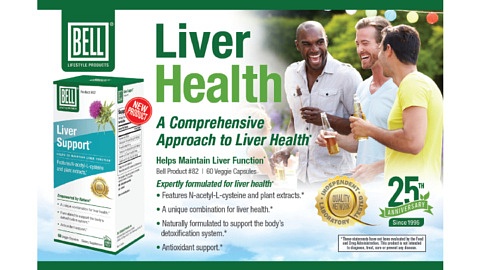December 15, 2022 – South Haven Michigan – Liver Support Bell Lifestyle Products announced today their new Liver Support product for the U.S....
Caring for the liver
The liver is an organ located within the abdomen, weighing approximately 3 lbs. This vital organ is part of the digestive system. Although there are many functions associated with the liver, most people commonly know it as the organ that processes and breaks down alcoholic beverages. However, there are approximately 500 functions of the liver, so recovering after a weekend of binge drinking is not the only reason why humans have a liver.
Common functions of the liver:
- Produces bile: bile is a type of fluid that helps break down fatty foods within the digestive tract. Foods high in fat are difficult to digest so bile is used to facilitate this complex digestive process.
- Produces cholesterol: cholesterol is made by the body, specifically within the liver. Although cholesterol has been given a bad rap it is used to help make hormones such as testosterone and estrogen, and it is also used to the border of human cells known as cell membranes.
- Stores glucose: the liver will store excess glucose from the diet in the form of glycogen. This protective reserve functions to provide essential energy when the body is not receiving an adequate supply from food.
- Remove toxins and poisons: the liver is commonly known as the detoxification organ primarily because it is able to identify, package and remove harmful or unwanted substances from the body. Any unwanted substances are broken down and their by-products are removed through either the digestive tract via bowel movements or through the urine via the blood and kidneys.
So, it’s no surprise that maintaining a healthy liver is important to overall health. Taking care of the liver involves eating a healthy diet, limiting alcoholic beverages, avoiding toxic and harmful substances such as drugs and reducing the risk of exposure to poisons and toxins.
Fatty liver is a condition whereby fat cells deposit and surround the liver, impeding essential functions of the liver. Fatty liver is classified as either non-alcoholic or alcoholic related, depending on the individual’s alcoholic intake. In either case, the liver has difficulty performing its daily duties and lead to other problems if not treated. Fatty liver is a treatable condition, particularly reducing the fatty accumulation around the organ through diet and exercise. If left untreated, fatty liver disease can lead to loss of liver function, cirrhosis and may result in a liver transplant as the only treatment option in the late stages.
Aside from consuming a healthy diet, reducing alcoholic consumption and increasing exercise as well as certain herbal supplements may help optimize and protect the liver.
- MILK THISTLE is the most researched plant for liver health. The seeds of this plan contain a natural compounds known as silymarin which have shown to reduce livery injury, treat alcoholic liver disease and protect overall liver health.
- N-ACETYL-L-CYSTEINE is an antioxidant compound that helps treat and reduce damage to the liver. In certain instances it is used successfully for the management of liver failure.
- DANDELION ROOT contains a variety of phytochemicals that help protect liver tissue and reduce damage. It is often used preventatively to help support a healthy liver.
Taking care of the this vital organ that does so much for the body on a daily basis can help contribute to overall health and wellness.
Related Posts
Men’s Digestive Health
Bell LifestyleMarch 31
Whether it’s flat or flabby, gut health is
an important factor in overall health. Medically speaking the gastrointestinal
tract (GI tract) is a complex...
The start of a new year provides the
opportunity for change and setting new goals. The most common resolutions made
on January 1st are losing weight, eating...
Men’s Digestive Health
Bell LifestyleMarch 31
Whether it’s flat or flabby, gut health is an important factor in overall health. Medically speaking the gastrointestinal tract (GI tract) is a complex...
The start of a new year provides the opportunity for change and setting new goals. The most common resolutions made on January 1st are losing weight, eating...
Categories
- Allergy Relief
- Bell Lifestyle News
- Brain and Vision Health
- Depression
- Digestive Health
- Eating Healthy
- Energy Boosts
- Fitness
- Foods for Energy
- Heart and Lung Health
- Herbs
- Immune System Support
- Lifestyle
- Men's Health
- Mental
- Motivation
- Natural Remedies
- Nutrition
- Pain Relief
- Physical
- Recipes
- Relationships
- Sexual Health
- Skin and Hair Health
- Sleep Health
- Social
- Stress Relief
- Uncategorised
- Videos
- Weight Management
- Women's Health
- Your Wellness Now
Follow us on Twitter
#90 Bladder One for Women™ is a convenient one-a-day capsule for urinary tract health, featuring herbal extracts in… twitter.com/i/web/status/1…
May 2023Urinary tract infections - UTI: To treat or prevent? That is the question. Find out more about causes and treatme… twitter.com/i/web/status/1…
May 2023"How you feel is very important to how you look. Healthy equals beautiful." - Victoria Principal #womenshealth https://t.co/OPShoEbOXb
May 2023
© Copyright 2024. All rights reserved.





